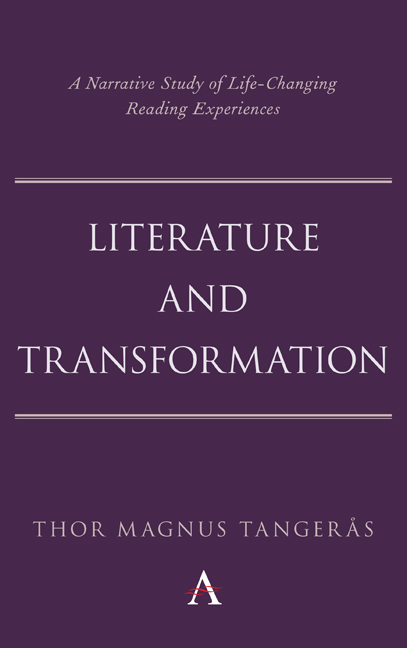Book contents
- Frontmatter
- Contents
- Preface
- Acknowledgements
- Chapter One Introduction
- Chapter Two Intimate Reading: A Narrative Method
- Chapter Three Veronica's Bruise
- Chapter Four Nina's Life-Long Friend Flicka
- Chapter Five Esther's Episode
- Chapter Six Jane's Visionary Reading
- Chapter Seven Sue's Buried Life
- Chapter Eight Reading by Heart: Lexithymia and Transformative Affective Patterns
- Bibliography
- Index
Chapter Two - Intimate Reading: A Narrative Method
Published online by Cambridge University Press: 25 March 2020
- Frontmatter
- Contents
- Preface
- Acknowledgements
- Chapter One Introduction
- Chapter Two Intimate Reading: A Narrative Method
- Chapter Three Veronica's Bruise
- Chapter Four Nina's Life-Long Friend Flicka
- Chapter Five Esther's Episode
- Chapter Six Jane's Visionary Reading
- Chapter Seven Sue's Buried Life
- Chapter Eight Reading by Heart: Lexithymia and Transformative Affective Patterns
- Bibliography
- Index
Summary
Crucial to the study of narratives and life histories are orientations to changes and turning points. Narrative psychologists McAdams and Bowman look at transitions and ‘changes in the direction or the trajectory of our lives’ with the aim of finding out how ‘people make meaning out of the transitions in their lives’. A central method for doing so is to study the stories people tell about their lives. McAdams and Bowman have identified a narrative sequence that is ‘especially prevalent in accounting for life-transitions or life-narrative turning-points’: when an emotionally negative situation is turned into a positive outcome, they label this a ‘redemption sequence’.
As such, the assumption and invocation of narrativity appears to be embedded in the research problem of life-changing reading experiences. In light of this, it would seem apposite to choose a narrative inquiry approach to my investigation of life-changing reading experiences. However, I encountered certain methodological problems with narrative inquiries, related to the ontological status of data, problems of selection and presentation, and how to interpret the narrative data. To address these problems, four critical procedures were developed: (1) subservation, the mode of attending to the readers’ communication of their experience; (2) text production, from a manuscript matrix of transcripts and memos a narrative is presented; (3) critical selection of the narratives, through a preliminary comparative analysis those narratives that corresponded most closely to the construct of life-changing experience of reading fiction were selected; and (4) idiographic interpretations based on the hermeneutic logic of anteroduction.
The Anteroductive Logic of Inquiry
A narrative of a life-changing reading experience implies a series of seven transformations from the act of reading:
1. Remembering this reading experience as life-changing
2. Telling the researcher about this in a dialogic exchange
3. Recording the dialogue
4. Transcribing the record of the dialogue and producing a text
5. Critical selection of texts for interpretation
6. Interpreting the texts idiographically
7. Appropriating the meaning of these interpretations
From one stage to the next, there is a transformation of meaning. Not only is the experience changed in remembering it, it is also changed in the dialogue of the telling, changed again in turning the transcript of the record into text and subsequently interpreting it. I am not concerned with what is lost at each point, or with what really happened.
- Type
- Chapter
- Information
- Literature and TransformationA Narrative Study of Life-Changing Reading Experiences, pp. 17 - 36Publisher: Anthem PressPrint publication year: 2020



